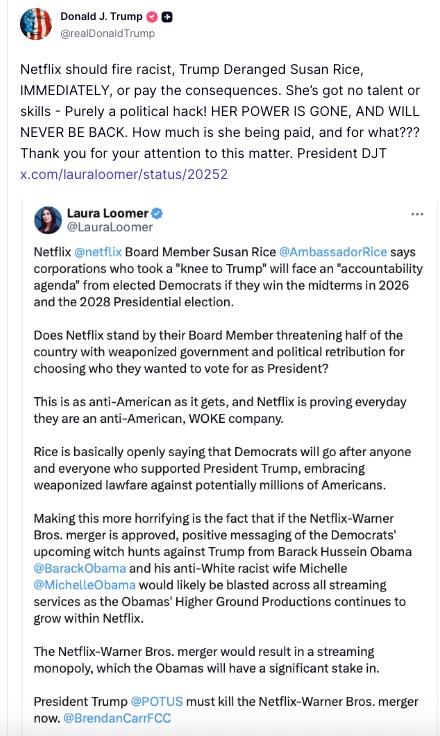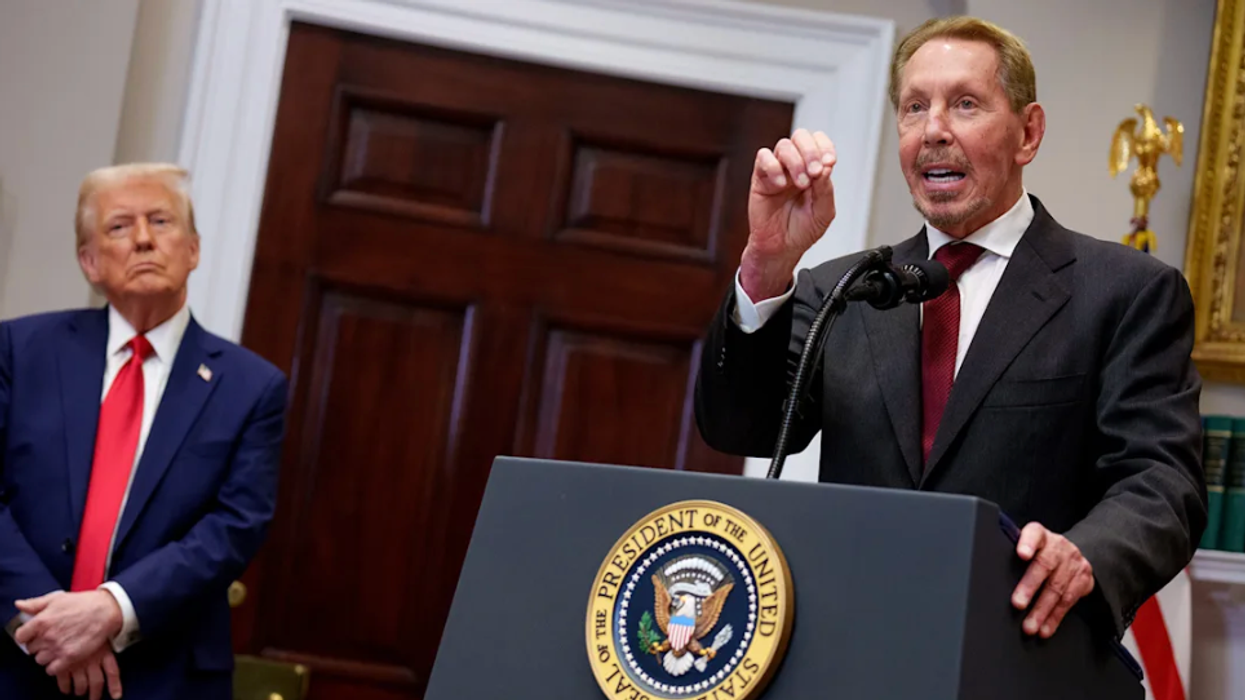Trump Escalates His Corrupt Scheme To Deliver CNN To Billionaire Ellison
President Donald Trump’s second term has been characterized thus far by America’s corporate leaders, including the owners of major media outlets, caving to his authoritarian threats of corrupt state retaliation. But with Trump’s public support cratering to levels not seen since he encouraged a mob of his supporters to sack the U.S. Capitol in 2021, the tide may be starting to turn.
Trump demanded in a Saturday social media post that Netflix “IMMEDIATELY” fire Susan Rice, who served in senior posts in the Obama and Biden administrations, from its board of directors — or face unnamed “consequences.” At issue were comments Rice made on a podcast last week about future accountability for corporations that violate the law on Trump’s behalf, which MAGA media figures denounced as a sign that “Democrats are out for blood” and plotting “retribution.”
Though the president did not detail the “consequences” Netflix would suffer for failing to bow to his whim, he was responding to an ally who urged him to “kill the Netflix-Warner Bros. merger now.” Trump actually cannot unilaterally cancel Netflix’s bid to take over Warner’s theatrical and streaming assets — but his administration can force it into expensive regulatory and court battles.
And Warner Bros. could, in turn, decide to pull out of their deal rather than face that scrutiny, leaving a potential acquisition open to rival bidder Paramount. That would surely be the preferred result for Trump, and could place Warner Bros.’ CNN subsidiary in the hands of Paramount’s owner David Ellison, a Trump supporter whose right-skewed stewardship of CBS News has drawn praise from the president. Ellison’s father, Larry Ellison, a megabillionaire and Trump ally, has reportedly already discussed with the White House which CNN hosts could be fired under their leadership.
But Netflix co-CEO Ted Sarandos, thus far, has refused to cave to Trump’s pressure. “This is a business deal. It's not a political deal," he told the BBC on Monday. “This deal is run by the Department of Justice in the U.S. and regulators throughout Europe and around the world.”
Sarandos defended the merger on its merits and minimized the import of the president’s comments, saying, “He likes to do a lot of things on social media.”
While Sarandos could still reverse himself and capitulate to Trump — or Warner Bros. could fold and switch to Paramount’s bid — the Netflix head’s public comments nonetheless stand out when compared to the behavior of media moguls like Jeff Bezos or Bob Iger. As we learned in Trump’s first term, corporate media leaders can defeat Trump’s authoritarian tactics — but only if they are willing to stand up to him.
How the right-wing freakout over Susan Rice’s remarks reached Trump
Rice, in a Thursday interview, pilloried law firms, media outlets, corporations, and others that have decided to act “in their perceived very narrow self-interest” to “take a knee” for Trump during his second term. She repeatedly warned that if those entities violated the law, they would be “held accountable” when Democrats come back into power.
“If these corporations think that the Democrats, when they come back in power, are going to, you know, play by the old rules, and say, ‘Oh, never mind, we’ll forgive you for all the people you fired, all the policies and principles you’ve violated, all, you know, the laws you’ve skirted,’ I think they’ve got another thing coming,” she told former U.S. Attorney Preet Bharara.
“You know, companies already are starting to hear they better preserve their documents,” she added. “They better be ready for subpoenas. If they’ve done something wrong, they’ll be held accountable, and if they haven’t broken the law, good for them.”
Right-wing media figures quickly seized on Rice’s comments, downplaying or ignoring the portions of her remarks in which she made clear that she was referring to entities that had broken the law in order to portray her as committing the Democrats to a campaign of retribution.
“Democrats are out for blood,” Fox News host Jesse Watters said Friday on The Five. “Former Obama lackey, Susan Rice, making it clear they want scalps if the Democrats take back power in the Midterms.
His co-host, Greg Gutfeld, added that what Rice was “saying is we'll destroy you when we come back unless you are obedient to us and do not play along,” adding that her remarks were “very anti-American.”
Fox & Friends Weekend co-host Rachel Campos-Duffy, the wife of Transportation Secretary and former Fox host Sean Duffy, interviewed Fox host Lara Trump, the president’s daughter-in-law, about Rice’s comments Saturday morning.
“Lara, I mean, they are vindictive,” Campos-Duffy began. “They are mad that anyone would dare to work with President Trump in his administration, and basically they're saying paybacks are a you-know-what.”
Lara Trump, with a smirk, described Rice’s comments as “straight out of the authoritarian playbook” to “intimidate and threaten your political opponents.”
“It’s just so amazing to see that these people are the ones who call President Trump a fascist. That is the behavior they’re displaying with this sort of thing,” she later added. “And don’t forget, President Trump always said, he said during the campaign and you’ve seen it as proof when he’s now been back in office, ‘My revenge will be success, success for this country.’ What a great statement, and maybe the Democrats want to pay attention to that.”
In reality, Reuters documented “at least 470 targets of retribution under Trump’s leadership – from federal employees and prosecutors to universities and media outlets” in a November report. More than a dozen of Trump’s political adversaries have faced criminal investigations, with prosecutors seeking federal charges in many of those cases. Trump himself has personally ordered such prosecutions, and has replaced prosecutors who refused to file the charges he has demanded.
Later on Saturday, Laura Loomer, a deranged bigot who wields a disturbing amount of influence over the president and his administration, weighed in — and tied Rice’s remarks back to Netflix and its bid for Warner Bros.
“Does Netflix stand by their Board Member threatening half of the country with weaponized government and political retribution for choosing who they wanted to vote for as President?” she asked. “This is as anti-American as it gets, and Netflix is proving everyday they are an anti-American, WOKE company.”
Loomer added that Rice’s remarks are “more horrifying” because “if the Netflix-Warner Bros. merger is approved, positive messaging of the Democrats' upcoming witch hunts against Trump … would likely be blasted across all streaming services.”
“President Trump @POTUS must kill the Netflix-Warner Bros. merger now,” she concluded, adding the handle of Federal Communications Commission Chair Brendan Carr.
Loomer’s diatribe drew support from Sen. Ted Cruz (R-TX), the chairman of the Senate’s Committee on Commerce, Science, and Transportation, which oversees the FCC. He wrote of Rice’s comments: “Does @netflix stand by their board member threatening punishment & persecution for half of America that dares to disagree with her?”
By the evening, Trump had signed on to Loomer’s rant.

Reprinted with permission from Media Matters












